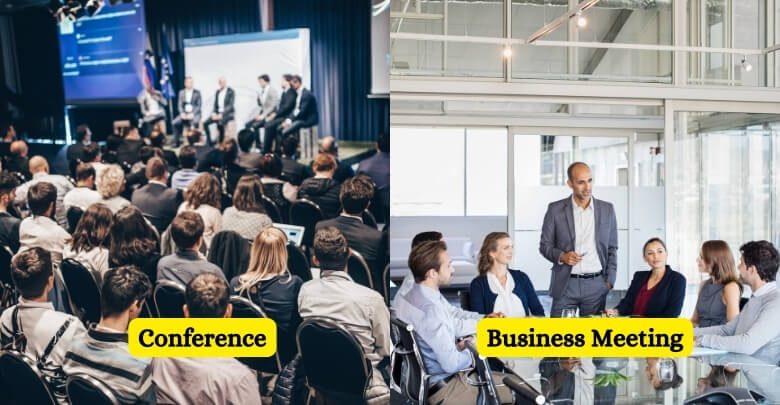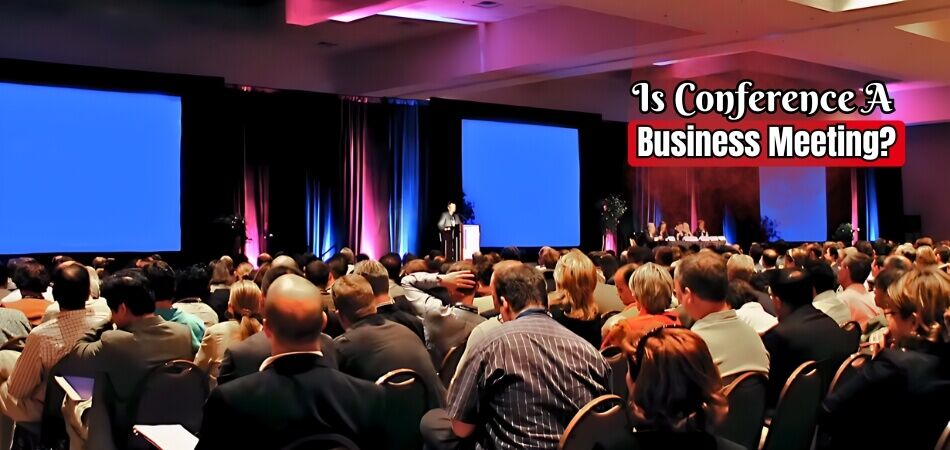Conferences and business meetings often blur the lines, leaving many to wonder, “Is conference a business meeting?” These events serve as essential platforms for professionals to connect, share knowledge, and explore new ideas. As industries evolve, understanding the distinctions between these gatherings can enhance networking opportunities and learning experiences.
The answer is yes, a conference can be considered a type of business meeting. However, not all business meetings qualify as conferences. While both involve discussions and networking, conferences typically encompass a broader range of activities and attendees, focusing on a specific theme or industry.
In essence, whether you’re attending a small team meeting or a large international conference, both play vital roles in promoting collaboration and growth. Taking advantage of the unique characteristics of each can help you manage your professional life more effectively.
What is a Conference and Business Meeting?
Conferences and business meetings play crucial roles in professional growth and organizational success. Each has a distinct purpose, so understanding them can help us approach them more effectively. Here’s explore what each entails.

Conference
A conference is a formal event where individuals gather to discuss specific topics or shared interests. These gatherings often attract experts, professionals, and enthusiasts from various fields to exchange knowledge, insights, and network with one another.
Whether it’s a local event or an upcoming business conference in Canada, such events can vary in scale, ranging from intimate group sessions to large international ones.
Typically, conferences feature presentations, workshops, panel discussions, and networking opportunities. Participants gain valuable knowledge on the latest trends and innovations, while also building connections and discovering new professional opportunities.
Business Meeting
A business meeting is a formal or informal gathering where professionals come together to discuss specific business matters, make decisions, or plan strategies. These meetings can range from small team discussions to larger board meetings, depending on the scale and purpose.
Business meetings typically focus on operational issues, project updates, client discussions, or financial matters. They provide a structured environment for problem-solving, collaboration, and decision-making.
Whether virtual or in-person, business meetings help ensure that everyone is aligned on goals, next steps, and organizational priorities, making them essential for efficient communication and progress within a company.
Is Conference a Business Meeting?
People often get confused between a conference and a business meeting and ask “Is conference a business meeting?” yes, a conference is a business meeting a like. To make the most of your professional engagements, understand the difference between a conference and a business meeting. While both are essential in the business world, they serve distinct purposes and offer unique benefits.
Conferences and business meetings serve distinct purposes, have different formats, and accomplish different outcomes, and it is essential to understand their key differences. Both types of gatherings play important roles in professional life, yet they serve different functions and audiences. Here’s a deeper dive into the distinctions between a conference and a business meeting.
Purpose and Objectives
The main difference between a conference and a business meeting lies in their purpose.
Conference: A conference is a large event designed for education, networking, and sharing knowledge. Professionals from various industries come together to discuss specific topics, share new ideas, and learn about the latest trends. Conferences typically feature keynote speakers, panel discussions, and workshops.
For example, when opening a business conference, the focus is usually on setting the tone for collaborative learning, presenting industry innovations, or offering a platform for professionals to network and explore new opportunities.
Business Meeting: A business meeting, on the other hand, is much more specific. The primary objective is to discuss particular issues, make decisions, or solve problems related to a specific project or business.
Business meetings typically involve a smaller group of people who work together, such as team members, stakeholders, or partners. Meetings are focused on immediate, actionable results and often result in clear outcomes like decisions, agreements, or action plans.
Scale and Attendees
The size and type of attendees at these two gatherings are also markedly different.
Conference: Conferences are large-scale events, often attracting hundreds or even thousands of attendees from diverse industries or professional backgrounds. These events are usually open to the public or anyone interested in the subject matter.
The attendees are generally there to expand their knowledge, network with peers, or showcase their expertise. Conferences provide a platform for people to meet new contacts and expand their professional horizons.
Business Meeting: In contrast, business meetings are more intimate, typically involving a small group of people. These individuals are directly related to the issue at hand, such as company stakeholders, department heads, or project team members.
The audience for a business meeting is exclusive to those involved in the specific business matters being discussed. Business meetings are closed, and the focus is more on internal collaboration than on networking with new people.
Agenda and Structure
The agenda and structure of a conference and a business meeting further highlight their differences.
Conference: Conferences are typically planned months or even years in advance and follow a structured program over several days. The agenda is usually packed with different sessions, such as keynote speeches, workshops, panel discussions, and networking opportunities. The opening speech of a business conference sets the tone for the event and highlights the key themes that will be explored.
The structure is designed to cater to a wide range of interests, allowing attendees to pick sessions that align with their professional needs. Conferences also provide breaks for socializing and networking, and in some cases, even host large evening events or dinners to further encourage relationship-building.
Business Meeting: Business meetings, however, are more focused and shorter in duration. The agenda is specifically designed to address certain topics that require discussion or decision-making.
Unlike conferences, business meetings can often be called on short notice, and their structure is straightforward, aiming to tackle business matters efficiently. The goal is typically to achieve a decision or create an actionable plan, rather than to educate or network.
Duration
The duration of conferences and business meetings is another distinguishing factor.
Conference: Conferences are typically multi-day events that provide extensive opportunities for learning and networking. Due to the variety of sessions and speakers, attendees often need several days to participate in everything that interests them.
The long duration is also necessary to accommodate the large number of attendees and to allow for various sessions, keynote addresses, and networking breaks.
Business Meeting: On the other hand, business meetings are usually much shorter, ranging from an hour to a full day, depending on the complexity of the issues at hand. Business meetings are focused, efficient, and designed to cover a specific topic or issue, which means they don’t require a lengthy time commitment.
Outcomes
The desired outcomes from a conference and a business meeting differ significantly.
Conference: The goal of a conference is to educate, inspire, and connect. Participants often leave a conference with new knowledge, fresh ideas, and professional connections. Conferences provide valuable opportunities for professional development and personal growth, but they typically don’t involve immediate decisions or actionable outcomes for participants’ businesses.
Business Meeting: The primary outcome of a business meeting is decision-making. Attendees are there to discuss a specific problem or opportunity and to decide on the next steps.
The meeting is results-oriented, and participants leave with a clear understanding of the decisions made or the actions that need to be taken. The goal is to advance a project, resolve a problem, or move the business forward in some way.
Conferences and business meetings are both vital in the professional world, but they serve distinct functions. A conference is an expansive, educational, and networking-focused event, often spanning multiple days and drawing attendees from various industries. A business meeting, in contrast, is a more focused, intimate gathering designed for collaboration, decision-making, and problem-solving within a specific business context. Professionals can make the most of each type of event by understanding these differences and approaching them with the correct mindset and goals.
What Types of Sessions Are Typically Held at A Conference?
The purpose of a conference is to educate, inspire, and connect attendees through a variety of activities. These gatherings are crucial for staying updated with industry trends and innovations. Here’s a breakdown of the different types of sessions you can typically expect at a conference.
Keynote Speeches
Keynote speeches are a highlight of any conference. These sessions feature prominent speakers who share their insights and experiences. They set the tone for the entire event, offering inspiration and motivation. Keynote speeches often address the latest industry trends and future directions.
Panel Discussions
Panel discussions involve several experts discussing specific topics. These sessions provide diverse perspectives and in-depth analysis. Audience members can ask questions, making these discussions interactive and engaging. They are an excellent way to gain comprehensive insights into complex issues.
Workshops
Workshops offer hands-on learning experiences. Participants engage in activities designed to teach new skills or techniques. These sessions are practical and interactive, allowing for immediate application of knowledge. Workshops are typically smaller, encouraging more personal interaction and feedback.
Networking Sessions
Networking sessions are vital for building professional relationships. These events provide structured opportunities to meet and connect with other attendees. They can include mixers, speed networking, or informal gatherings. Networking helps attendees expand their professional contacts and explore collaboration opportunities.
Breakout Sessions
Breakout sessions focus on specific topics in smaller group settings. They allow for detailed discussions and targeted learning. Participants can choose sessions that match their interests and needs. Breakout sessions often include interactive elements to engage attendees.
Poster Presentations
Poster presentations are often part of academic or research conferences. Research is displayed on posters and discussed with conference attendees, while a PPT is presented during a conference. It allows for one-on-one interactions and detailed explanations, which are particularly useful to researchers for sharing findings
Exhibitions
Exhibitions showcase products, services, and innovations related to the conference theme. Companies and organizations set up booths to display their offerings. Attendees can explore new technologies and trends in the industry. Additionally, note that tax deductions for business conference expenses can provide financial relief, making these exhibitions even more valuable for professionals. Exhibitions provide a great opportunity to discover the latest advancements.
Do Attendees Prepare Differently for A Conference versus A Business Meeting?
Yes, attendees prepare differently for a conference versus a business meeting. Preparation for conferences and business meetings involves distinct approaches according to the event’s nature and goals.
Conferences often require attendees to research speakers, plan which sessions to attend, and develop networking strategies. This preparation aims to maximize the learning and networking opportunities that conferences offer. In contrast, business meetings demand participants to review agendas, gather necessary data, and ensure they contribute effectively to meeting objectives.
The difference in preparation reflects the unique focus and format of each event. A conference offers a wide range of sessions and interactions, while a business meeting targets particular issues or decisions. Whether seeking knowledge, networking, or strategic planning, attendees can make the most of each event type.
Researching Speakers and Sessions
Conference attendees often research speakers to identify those whose expertise aligns with their interests. This helps in selecting which sessions to attend for maximum benefit. Planning ensures attendees can prioritize the most relevant topics. It allows for a more tailored and productive conference experience.
Networking Strategies
Developing a networking strategy is crucial for conference attendees. Identifying key contacts and planning how to approach them increase networking success. Conferences offer structured opportunities for professional connections. Preparing in advance can lead to meaningful interactions and potential collaborations.
Reviewing Agendas
For business meetings, participants typically start by reviewing the meeting agenda. Understanding the topics to be discussed helps in preparing relevant contributions. It ensures that attendees are aligned with the meeting’s objectives. This preparation is key to a focused and productive meeting.
Gathering Necessary Data
Business meeting preparation often involves collecting relevant data and information. Participants need to have facts and figures ready to support their points. This preparation ensures that discussions are informed and decisions are based on accurate information. It increases the overall effectiveness of the meeting.
Contributing to Objectives
Ensuring they can contribute to meeting objectives is a primary focus for business meeting attendees. This means understanding the desired outcomes and preparing to support them. Effective participation helps in achieving the meeting’s goals. This involves aligning individual contributions with the collective objectives.
Planning Conference Attendance
Planning which sessions to attend at a conference is essential. With multiple tracks and concurrent sessions, attendees need to choose wisely. Prioritizing sessions based on interests and goals maximizes the learning experience. It ensures that attendees gain the most value from their time at the conference.
Preparing Presentation Materials
If presenting, both conference and business meeting attendees must prepare their materials thoroughly. This includes creating slides, handouts, or reports. Practicing the presentation is also crucial for effective delivery. Well-prepared materials and practice ensure clarity and engagement during the presentation.
Frequently Asked Questions
Professionals need to know the difference between a conference and a business meeting. Here are some frequently asked questions and their answers to help clarify these distinctions.
What Is the Main Purpose of A Conference?
The main purpose of a conference is to share knowledge, network, and discuss industry trends. Conferences provide learning opportunities through various sessions and workshops. They aim to inspire and educate attendees.
Can a Conference Include Business Meetings?
Yes, conferences can include business meetings as part of their agenda. These meetings usually focus on specific projects or organizational strategies. They complement the broader learning and networking activities of the conference.
Why Are Conferences Important for Professional Development?
Conferences are crucial for professional development because they offer diverse learning opportunities. Attendees can gain insights from industry experts, participate in workshops, and network with peers. This exposure helps in career growth and knowledge expansion.
How Long Do Conferences and Business Meetings Typically Last?
Conferences often span several days, featuring multiple sessions and events. Business meetings are usually shorter, lasting a few hours to a full day. The duration reflects the scope and objectives of each event.
Are Business Meetings More Focused than Conferences?
Yes, business meetings are generally more focused than conferences. They target specific agendas and immediate business issues. Conferences, however, cover a wider range of topics and are designed for broader professional development.
Bottom Lines
Professional development requires understanding the difference between conferences and business meetings. Attendees can attend keynote speeches, panel discussions, and networking sessions at conferences. Business meetings address specific business issues with detailed agendas and data-driven discussions.
Preparation for each type of event varies significantly. Attendees should research speakers, plan their sessions, and develop networking strategies. Agendas must be reviewed, relevant data gathered, and participants must contribute effectively. Each type of gathering benefits from this tailored approach.
As a result, the question “Is conference a business meeting?” emphasizes the need for differentiation. Different preparation strategies are needed for meetings and conferences. These differences can increase participant’s professional growth. A clear understanding of the benefits and requirements of a meeting or conference is key.







